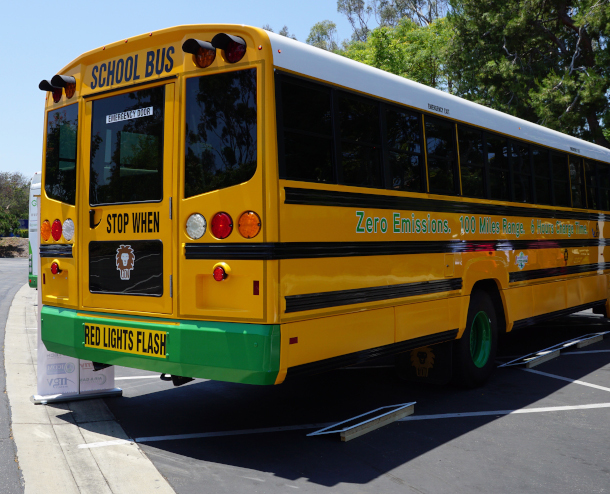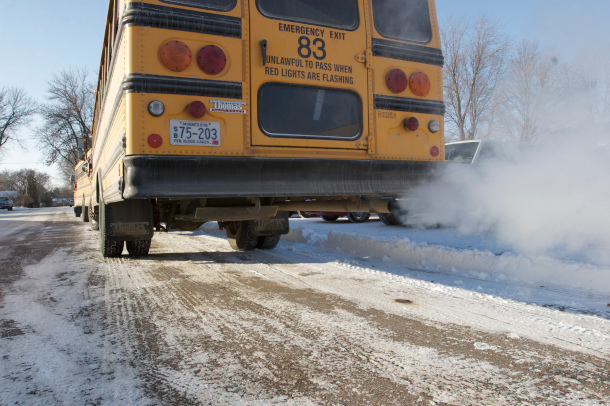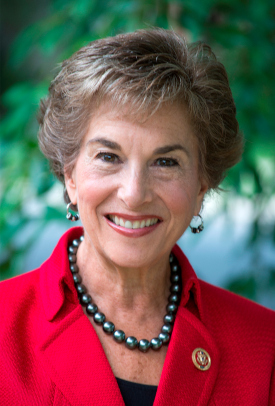Red Tape for Green Buses
Air Date: Week of February 10, 2023

The EPA has begun a Clean School Bus Program that low-income communities across the country are able to apply for, but there’s a catch: some school districts are unable to fulfill the scrappage requirement. (Photo: Caitlin Looby, UCI Sustainability, Flickr, CC BY-NC-ND 2.0)
To replace polluting diesel school buses with clean electric ones the bipartisan infrastructure law signed by President Biden in 2021 allotted $5 billion over five years for low-income communities. But an unintended consequence of the measure’s terms prevents some of the neediest communities from benefiting from the program. Congresswoman Jan Schakowsky (IL-09) joins Host Steve Curwood from Washington, D.C. to explain what changes she and other lawmakers are calling for.
Transcript
CURWOOD: Under the bipartisan infrastructure law signed by President Biden the Environmental Protection Agency was allocated $5 billion over five years for low-income communities to replace polluting diesel school busses with clean-energy ones. But as the electric bus program is starting to roll out, critics say the EPA’s definition of low-income school districts prevents some needy communities from benefiting. The law also requires that grantees must scrap their old diesel buses. But since many of these low-income school districts outsource their transportation and don’t directly own buses, they are ineligible for this program that is supposed to help communities often disproportionately exposed to unhealthy air to begin with. Congresswoman Jan Schakowsky represents the 9th district of Illinois and she joins us now from Washington. Congresswoman, welcome to Living on Earth.
SCHAKOWSKY: Thank you so much.
CURWOOD: Now, Congresswoman, I understand that you and a group of other Illinois lawmakers have written to the Environmental Protection Agency urging them to revise their scrappage requirements. What does that rule ask? And what, if anything, have you heard back from the EPA on the matter?
SCHAKOWSKY: Well, there's a couple of problems with actually implementing what is really a good idea. For one thing, it requires by law, that you trade in the diesel bus that you've been using for an efficient piece of equipment. But some of the school districts actually don't own their own school buses, and they rent from companies that do, and they are not in a position to make the swap. So that is one of the problems. One of the other ones for us in Illinois and in Chicago, and Senator Durbin and I are concerned about it, that rightfully so, the money has to go to more lower-income districts. But the city of Chicago, because it's counted as just one district does not qualify, not any of the neighborhoods in the city of Chicago qualify, because if you average it out, we don't meet the requirements. But we would like to see the idea that lower-income school districts that are using the diesel fuel are able still to be eligible. And we'd like to see a change in the EPA. But so far, we haven't seen it.
CURWOOD: So as I understand it, then the EPA has little flexibility to deal with this situation. They're looking at the law, the way the law is written. And to what extent might they be able to somehow accommodate?

The toxic soot including PM2.5 particulates from diesel fumes are linked to various cardiovascular diseases and respiratory conditions, such as asthma and COPD. (Photo: MPCA Photos, Flickr, CC BY-NC 2.0)
SCHAKOWSKY: Well, it's not such a crazy idea to say that we adjust the law to accomplish the goals that we really want to accomplish. That's the problem. It's standing in the way of the intention of this program, to make our children safer on the bus. And so if there is this flaw, in the way that the law is written, that prohibits the most eligible of our children to have electric buses, then we need to change the law. I think the pressure is going to have to come from governors, from mayors, from residents, from ordinary people, who say I want my kids to be able to have safe travel to and from schools. And we're going to just have to organize around this. So I know that we've got senators as well as representatives on our team to be able to make this law workable for the communities that need them most. You know, the $5 billion over five years, is a pretty sparse investment, and making sure that the transportation for our kids is adequate, I think it's, you know, it's an okay start. But we have to make sure that they are number one on the list, and that we are investing as much money as it's going to take to make all communities safer. I think it's good that we are focusing more on the low-income communities. But there are middle level communities right now that aren't able to get that support. We need to do better.
CURWOOD: So what happened in the drafting of this law that got us into this situation, in your view? To what extent were people not paying attention? To what extent was there a last minute compromise by folks who understood maybe this would cut out poor communities? Why do you think this happened?
SCHAKOWSKY: Oops! I do think that the idea of a swap, okay, we will give you electric school buses, if you get rid of the diesel ones; not really understanding, I think, or foreseeing that this was not going to be possible in a number of communities. That's why I think it ought to be really a pretty easy fix to make the change. I think it was just not really foreseen that this was going to be a huge issue.
CURWOOD: You're now at the beginning of your 13th term on Capitol Hill, you've been there a couple of decades plus. So as someone who has survived and thrived in that environment, what's the next move for you to get this settled?

US Rep. Jan Schakowsky (D-IL) is in her thirteenth term. (Photo: Jan Schakowsky, Wikimedia Commons, public domain)
SCHAKOWSKY: Look, I do believe that there is growing concern about these environmental issues, about the health consequences of the bad environment that all of us are living in, the costs that we incur because of health care if we don't do these things right. I don't see it as a partisan issue. I do think that these kinds of things, especially when it deals with children, we ought to be able to make progress. As divided as it looks right now, often when it comes to the committee work, when you get down to the work on individual issues, we're going to be able to get things passed on a bipartisan way. And certainly with a higher understanding of the importance of the health care costs that are created, because of the bad environment, because of the pollution, because of the diesel fuel, I am hoping that we're going to be able to move ahead and make a difference.
CURWOOD: Congresswoman Jan Schakowsky is serving her 13th term representing Illinois ninth district. Congresswoman, thanks so much for taking the time with me today.
SCHAKOWSKY: Well, thank you, I appreciate it.
Links
Living on Earth wants to hear from you!
Living on Earth
62 Calef Highway, Suite 212
Lee, NH 03861
Telephone: 617-287-4121
E-mail: comments@loe.org
Newsletter [Click here]
Donate to Living on Earth!
Living on Earth is an independent media program and relies entirely on contributions from listeners and institutions supporting public service. Please donate now to preserve an independent environmental voice.
NewsletterLiving on Earth offers a weekly delivery of the show's rundown to your mailbox. Sign up for our newsletter today!
 Sailors For The Sea: Be the change you want to sea.
Sailors For The Sea: Be the change you want to sea.
 The Grantham Foundation for the Protection of the Environment: Committed to protecting and improving the health of the global environment.
The Grantham Foundation for the Protection of the Environment: Committed to protecting and improving the health of the global environment.
 Contribute to Living on Earth and receive, as our gift to you, an archival print of one of Mark Seth Lender's extraordinary wildlife photographs. Follow the link to see Mark's current collection of photographs.
Contribute to Living on Earth and receive, as our gift to you, an archival print of one of Mark Seth Lender's extraordinary wildlife photographs. Follow the link to see Mark's current collection of photographs.
 Buy a signed copy of Mark Seth Lender's book Smeagull the Seagull & support Living on Earth
Buy a signed copy of Mark Seth Lender's book Smeagull the Seagull & support Living on Earth

